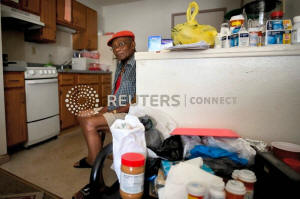As Dorian nears, Florida nursing homes face heat for lacking generators
 Send a link to a friend
Send a link to a friend
 [August 31, 2019]
By Scott Malone [August 31, 2019]
By Scott Malone
(Reuters) - One in five Florida nursing
homes on Friday were counting on temporary generators to be delivered
before Hurricane Dorian hits, according to the state agency charged with
ensuring their residents will have air conditioning if power is knocked
out.
The state legislature passed the law requiring generators after a dozen
people died in a sweltering nursing home after 2017's Hurricane Irma.
State officials are also racing to check some 120 nursing homes and
assisted living facilities where they are unsure if generators or
contingency plans are in place, Governor Ron DeSantis told a news
conference.
Residents, meanwhile, scrambled to board up windows and stock up on food
ahead of the storm, which is forecast to grow into a potentially deadly
major hurricane before it roars ashore early on Tuesday.
Generators are an urgent matter in Florida, an aging state where some
190,000 people live in nursing homes and assisted-living facilities.
DeSantis' predecessor, Rick Scott, signed the March 2018 law requiring
nursing homes to be able to keep temperatures at or below 81 degrees
Fahrenheit (27°C) for at least 72 hours after losing power.

The law followed problems in the wake of 2017's Hurricane Irma, which
knocked out electricity to a wide swath of the state. This week, police
in Hollywood, Florida, charged four nursing home employees with causing
the deaths of 12 patients in the sweltering heat of a power outage that
followed Irma.
"There are going to be site checks, there are going to be phone calls to
make sure that they have a plan to deal with folks that are in their
care," DeSantis said.
State data shows just 41.8% of Florida's 687 nursing homes have
permanent generators in place, with 36.4% having temporary generators on
site. Some 21.4%, or 147 nursing homes with beds for 17,754 people, have
arrangements to have temporary generators delivered if they lose power,
while three with the capacity to house a total 338 people, would
evacuate if they lose power.
The picture is brighter among the state's 3,061 assisted-living
facilities, which can house 106,086 people. Fully 94.3% of those sites
have permanent generators in place, according to Florida's Agency for
Health Care Administration.
[to top of second column]
|

Two days after Hurricane Irma, William James, 83, sits without
power, food or water, in his room at Cypress Run, an assisted living
facility, in Immokalee, Florida, U.S., September 12, 2017.
REUTERS/Bryan Woolston/File Photo

State legislative records, however, show hundreds of nursing homes
have received waivers allowing them to operate with temporary
generators, even though the 2018 law intended for all sites to have
permanent generators by the start of last year's hurricane season.
"There are tens of thousands, multiple tens of thousands of people
whose safety could be at risk in this situation. And we've had two
years to prepare for this," said Dave Bruns, a spokesman for the
Florida chapter of AARP, a group representing Americans aged 50 and
over, in a phone interview. "That we find ourselves in this
situation is disappointing."
The state AHCS agency, which oversees nursing home and
assisted-living facilities in the state, said it was working to
ensure that all those sites complied with the law.
"Our agency remains committed to making sure long term care
facilities can support safe conditions during loss of power," AHCA
Secretary Mary Mayhew said in a statement.
Many of the state's larger nursing homes are as much as 30 years
old, meaning that installing generators can take extensive
regulatory review as well as potentially replacing entire electrical
systems, said Kristen Knapp, a spokeswoman for the Florida Health
Care Association, which represents about 80 percent of the state's
nursing homes.
"These aren't generators that you go to Home Depot and purchase and
plug in," Knapp said. She added that following the declaration of a
state of emergency, nursing home operators had 24 hours to get their
temporary generators delivered: "Ideally, those generators are all
going to be in place before Dorian even makes landfall."
(Reporting by Scott Malone in Boston; Editing by Dan Grebler and
Alistair Bell)
[© 2019 Thomson Reuters. All rights
reserved.]
Copyright 2019 Reuters. All rights reserved. This material may not be published,
broadcast, rewritten or redistributed.
Thompson Reuters is solely responsible for this content. |